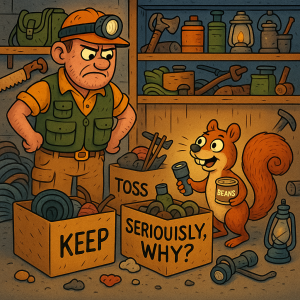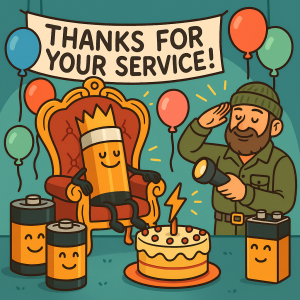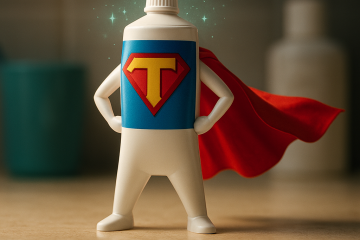
Decluttering is just as important for preppers
Prepper or Packrat? Decluttering When You’re Emotionally Attached to Old Batteries
Let’s have a heart-to-heart, prepper-to-prepper
Let’s face it: at some point in every prepper’s journey toward self-reliance, you find yourself standing knee-deep in Rubbermaid tubs and mystery buckets, holding a bag of remote controls and three headlamps with no straps, having an existential crisis about whether you’re a prudent planner…or just a sentimental squirrel with a storage problem.
You tell yourself, “This isn’t hoarding. It’s strategic resource allocation.” But when you start naming your flashlight collection (“This one’s Sparky, and this little guy only works if you shake it like a maraca”), it might be time for a little decluttering—and maybe a little introspection. Or at least a tetanus shot.
The Emotional Attachment Test
Ask any seasoned prepper why they still have 27 mismatched Tupperware lids, and you’ll hear things like:
“That’s the good size for homemade butter.”
“Someday, I’ll find the bottom that fits.”
“You never know when you’ll need a makeshift Frisbee or tiny riot shield.”
But deep down, it’s not really about the lids, is it? It’s about security, nostalgia, and that time you watched your neighbor barter a single AA battery for half a Snickers during the Great Power Outage of ’07. We’re not just storing stuff; we’re storing memories, “just in case” scenarios, and a couple of “but what ifs” that never got closure.
Expiration Dates: Food vs. Batteries
Now, let’s settle the age-old prepper debate: expiration dates. If food expiration dates were a sacred prophecy, my grandma’s pickles would’ve never seen Y2K. Here’s the truth:
Food, when stored properly (cool, dark, dry, sealed), can last years—sometimes decades—past its so-called “best by” date. Those dates are mostly lawyer-speak and marketing magic, not science. Trust your senses. If it looks, smells, and tastes as it should, you’re likely fine. (Just don’t go rolling the dice on home-canned mystery meat from 1985.)
Batteries, on the other hand, are the divas of the storage world. They don’t age gracefully. Even if you store them like pharaoh’s gold, they’ll eventually lose juice, and sometimes they’ll leak, corrode, or try out for the “Crustiest Thing in the Drawer” competition. When it comes to batteries, there’s such a thing as being too sentimental.
How to Test If Your Batteries Are Still Good (Without Licking Them—Seriously, Don’t)
1. The Gadget Test:
Find your favorite device—a flashlight, radio, or even that one remote you haven’t used since Pluto was a planet. Pop in the suspect batteries. If it powers up, those batteries are still living their best life. If your flashlight is dimmer than a politician’s apology, it’s time to let go.
2. Use a Battery Tester:
This is the prepper’s secret weapon. A basic battery tester costs less than a drive-thru burger and instantly shows if your AA, AAA, C, D, or 9V is still packing power. No more guesswork, just results: green for go, red for recycle. Bonus: this step gives you permission to feel smugly competent.
3. The Drop Test (For Alkaline AA/AAA Only!):
Want to impress your friends at the next prepper potluck? Drop the battery vertically onto a hard surface from about 6 inches up:
-
Good batteries land with a satisfying thud and may stay upright.
-
Dead ones bounce around like they’ve just been told there’s a canned bean shortage.
Is this scientific? Sort of. As alkaline batteries get depleted, the insides change and make them bouncier. It’s not Nobel-worthy, but it works in a pinch. (Pro tip: Don’t try this with rechargeable or lithium batteries—they’re not in on the joke.)
How to Declutter Like a Pro (Without Needing a Support Group)

Retiring old batteries
-
Step 1: The 5-Second Rule (No, Not for Food)
If you can’t remember in 5 seconds what that cable, cap, or plastic widget goes to, you probably don’t need it. Exceptions made for anything that looks like it could control the space station.Step 2: Respect the Expiration Date
If your batteries are old enough to have voted for Y2K, they’re probably not going to save you in a blackout. Science says: toss ’em. (Just don’t taste test. Seriously.)Step 3: Take a Picture, Then Pitch It
Some of us are attached to things for the story, not the stuff. Snap a picture, write a haiku about your old solar charger, then donate it to a future archaeologist (or just recycle it responsibly).Step 4: Set “Prepper Priorities”
Does it keep you safe? Warm? Fed? Or does it just collect dust and trigger an avalanche every time you open the closet? Prepper gear should have a job description. If it can’t pass the interview, it’s time to let it go.Step 5: Pass It On
One person’s “broken egg beater” is another person’s…well, probably trash, but who knows? Try your local Buy Nothing group, or host a “Prepper Purge Party” (theme: snacks, stories, and solemn goodbyes to expired iodine tablets).
A Bit of Introspection—Minus the Tears
Remember, self-reliance isn’t about holding onto every “just in case” you’ve ever met. It’s about making space for what’s actually useful—so you can find the flashlight before the power goes out, not during a three-act opera of junk drawer drama.
Takeaway:
Decluttering as a prepper is about sharpening your edge, not dulling your joy. Keep the food that’s safe (the lawyers can argue with your nose), pitch the batteries that are better at bouncing than powering, and let your stash—and your sanity—breathe. Because being prepared should feel like freedom, not a future episode of “Extreme Preppers: The Closet Strikes Back.”


